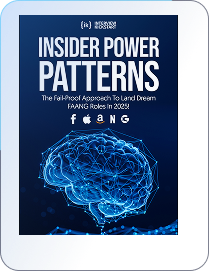Python is an easy-to-learn, high-level, indentation-sensitive, general-purpose programming language. Its design philosophy is big on readability and supports an object-oriented approach. We can often solve coding questions based on data structures and algorithms quite succinctly and cleanly in Python. Given the popularity and importance of Python, you can expect high-quality Python interview questions in your Google interview.
What Do Experts Say?

“I chose Python as a working title for the project, being in a slightly irreverent mood, and a big fan of Monty Python’s Flying Circus.”
– Guido van Rossum
(Creator of Python)
If you are preparing for a tech interview, check out our technical interview checklist, interview questions page, and salary negotiation ebook to get interview-ready! Also, read Amazon Coding Interview Questions, Facebook Coding Interview Questions, and Google Coding Interview Questions for specific insights and guidance on Google Python tech interviews.
Having trained over 17,000 software engineers, we know what it takes to crack the toughest tech interviews. Our alums consistently land offers from FAANG+ companies. The highest ever offer received by an IK alum is a whopping $1.267 Million!
At IK, you get the unique opportunity to learn from expert instructors who are hiring managers and tech leads at Google, Facebook, Apple, and other top Silicon Valley tech companies.
Want to nail your next tech interview? Sign up for our FREE Webinar.
This article focuses on Google Python interview questions to help you prepare for your next Python interview at Google. Read ahead to learn more!
In this article, we’ll cover:
We’ll begin with some sample Google Python interview questions and answers to get a basic idea of what to expect.

We can use the lower() function to convert a string to lowercase. And for converting a string to uppercase, we can use the upper() function. Lastly, we can use the capitalize() method to capitalize the first letter of a string.
Self is an instance/object of a class and is explicitly included in Python as the first parameter, unlike in Java, where it’s optional. In the init method, self refers to the newly created object. In methods other than init, self refers to the object whose method was called.
A lambda function refers to an anonymous function with any number of parameters but can only have a single statement. An iterator is an object that we can iterate upon/traverse through. Lastly, a generator is a function that returns an iterable set of items.
__init__ Â represents a method/constructor in Python, and all classes have an __init__ method. This __init__ method is automatically called to allocate memory whenever a new object or instance of a class is created.
To delete a file in Python, we can import the OS Module and then use the os.remove() function to delete the files. Python packages represent namespaces that contain several modules.
Recommended Reading:How to Crack Python Coding Interviews
Here are some Google Python interview questions. Ensure you can solve them before your interview:
Learn about the Top 16 Functions in Python you should know
Let’s move a step further with some advanced Google Python interview questions for experienced developers:
Here are some more Advanced Python Interview Questions and Answers for you to practice.
Lastly, here are some technical Google Python interview questions. Ensure you can solve them before your coding interview:
These are some Advanced Python Coding Challenges that you can solve to nail your coding interview.
We hope that this list of Google Python interview questions will help you crack your tech interview. Practice some mock interviews and read our guide to 12 key preparation tips to crack an interview to prepare better.
Q1. Can I use Python in Google interviews?
Yes, you can use Python in your Google interview. Python can help you convey some comprehension and approach checkpoints faster in an interview.
Q2. How to prepare for the Google Python interview?
You can start by learning about the Google interview process to see what they’re looking for and what they value. Then, train yourself in that direction. You can start your training by designing your plan based on your starting point, how much time you have, and the areas that require most of your attention. Following this, the standard advice of practicing DSA coding questions, resting as needed, taking mock interviews, etc., applies well.
Q3. Are Google interviews hard?
Yes, you can expect Google coding interviews to be more challenging than average and the questions to use a wide range of topics. The questions are unique to Google and test your understanding. So the questions often don’t precisely follow a standard question pattern you can memorize. Note that with good preparation, challenging questions feel like engaging questions.
Q4. What do Google interviewers look for?
Google interviewers look for and grade you on their four principles of cognitive ability, leadership, role-related knowledge, and Googleyness.
Q5. What are some ML algorithms used in Python?
ML algorithms commonly used in Python include linear regression, logistic regression, naive Bayes, decision tree, and Support Vector Machines (SVM).
Whether you’re a coding engineer gunning for a software developer or software engineer role, a tech lead, or targeting management positions at top companies, IK offers courses specifically designed for your needs to help you with your technical interview preparation!
If you’re looking for guidance and help with getting started, sign up for our FREE webinar. As pioneers in technical interview preparation, we have trained thousands of software engineers to crack the most challenging coding interviews and land jobs at their dream companies, such as Google, Facebook, Apple, Netflix, Amazon, and more!
Attend our free webinar to amp up your career and get the salary you deserve.

693+ FAANG insiders created a system so you don’t have to guess anymore!

100% Free — No credit card needed.

Time Zone:






Get your enrollment process started by registering for a Pre-enrollment Webinar with one of our Founders.

The 11 Neural “Power Patterns” For Solving Any FAANG Interview Problem 12.5X Faster Than 99.8% OF Applicants
The 2 “Magic Questions” That Reveal Whether You’re Good Enough To Receive A Lucrative Big Tech Offer
The “Instant Income Multiplier” That 2-3X’s Your Current Tech Salary

The 11 Neural “Power Patterns” For Solving Any FAANG Interview Problem 12.5X Faster Than 99.8% OF Applicants
The 2 “Magic Questions” That Reveal Whether You’re Good Enough To Receive A Lucrative Big Tech Offer
The “Instant Income Multiplier” That 2-3X’s Your Current Tech Salary
Just drop your name and email so we can send your Power Patterns PDF straight to your inbox. No Spam!
By sharing your contact details, you agree to our privacy policy.
Time Zone: Asia/Dhaka

We’ve sent the Power Patterns PDF to your inbox — it should arrive in the next 30 seconds.
📩 Can’t find it? Check your promotions or spam folder — and mark us as safe so you don’t miss future insights.
We’re hosting a private session where FAANG insiders walk through how they actually use these Power Patterns to crack interviews — and what sets top performers apart.
🎯 If you liked the PDF, you’ll love what we’re sharing next.
Time Zone:

